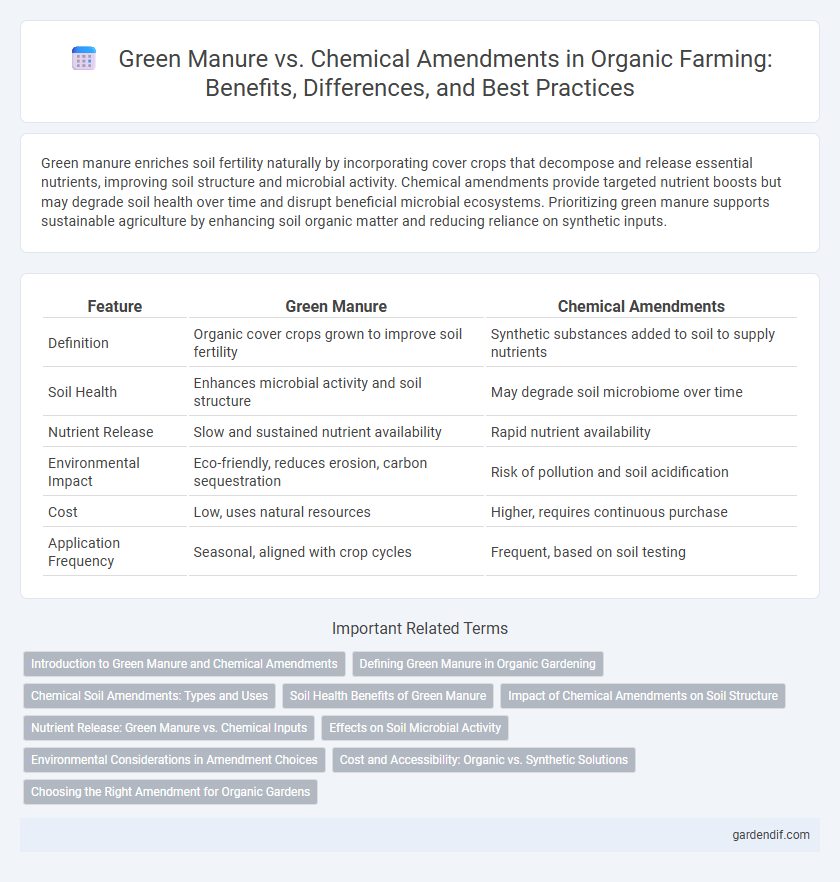
Green manure vs Chemical amendments Illustration
Green manure enriches soil fertility naturally by incorporating cover crops that decompose and release essential nutrients, improving soil structure and microbial activity. Chemical amendments provide targeted nutrient boosts but may degrade soil health over time and disrupt beneficial microbial ecosystems. Prioritizing green manure supports sustainable agriculture by enhancing soil organic matter and reducing reliance on synthetic inputs.
Table of Comparison
| Feature | Green Manure | Chemical Amendments |
|---|---|---|
| Definition | Organic cover crops grown to improve soil fertility | Synthetic substances added to soil to supply nutrients |
| Soil Health | Enhances microbial activity and soil structure | May degrade soil microbiome over time |
| Nutrient Release | Slow and sustained nutrient availability | Rapid nutrient availability |
| Environmental Impact | Eco-friendly, reduces erosion, carbon sequestration | Risk of pollution and soil acidification |
| Cost | Low, uses natural resources | Higher, requires continuous purchase |
| Application Frequency | Seasonal, aligned with crop cycles | Frequent, based on soil testing |
Introduction to Green Manure and Chemical Amendments
Green manure involves growing specific plants to enhance soil fertility by adding organic matter and nutrients through natural decomposition, promoting soil structure and microbial activity. Chemical amendments refer to synthetic fertilizers and substances designed to adjust soil pH or nutrient content rapidly but may impact long-term soil health negatively. Organic farming prioritizes green manure for sustainable nutrient cycling and improved soil ecosystem resilience over chemical amendments.
Defining Green Manure in Organic Gardening
Green manure refers to specific cover crops grown primarily to enhance soil fertility and structure naturally in organic gardening. These plants, such as clover, alfalfa, and rye, are incorporated into the soil to increase organic matter, improve nutrient cycling, and promote microbial activity. Unlike chemical amendments, green manure provides a sustainable, eco-friendly alternative that enriches soil health without synthetic inputs.
Chemical Soil Amendments: Types and Uses
Chemical soil amendments include materials such as lime, gypsum, and synthetic fertilizers that modify soil pH, improve nutrient availability, and enhance soil structure. Lime is primarily used to raise soil pH in acidic soils, while gypsum supplies calcium without altering pH and improves soil permeability in heavy clay soils. Synthetic fertilizers provide targeted nutrient supplementation, boosting crop growth but requiring careful management to prevent environmental impact.
Soil Health Benefits of Green Manure
Green manure significantly enhances soil health by increasing organic matter and improving soil structure, leading to better aeration and water retention. Unlike chemical amendments, green manure fosters beneficial microbial activity and nitrogen fixation, promoting long-term soil fertility without harmful residues. This natural approach reduces erosion and boosts nutrient cycling, making it a sustainable choice for maintaining soil vitality in organic farming systems.
Impact of Chemical Amendments on Soil Structure
Chemical amendments often lead to soil compaction and reduced porosity, negatively affecting soil structure and water infiltration. Unlike green manure, which enhances organic matter and promotes microbial activity, chemical inputs can disrupt soil microbial communities and reduce aggregate stability. Over time, reliance on chemical amendments may degrade soil health, decreasing its fertility and resilience.
Nutrient Release: Green Manure vs. Chemical Inputs
Green manure releases nutrients gradually through natural decomposition, enhancing soil organic matter and microbial activity, which improves long-term soil fertility. Chemical amendments provide immediate nutrient availability but can lead to nutrient leaching and soil degradation if overused. Sustainable nutrient management relies on balancing green manure's slow release with targeted chemical inputs for optimal crop nutrition.
Effects on Soil Microbial Activity
Green manure significantly enhances soil microbial activity by providing organic matter that serves as a food source for beneficial microbes, improving soil structure and nutrient cycling. Chemical amendments often disrupt microbial communities due to their synthetic composition, potentially reducing microbial diversity and soil health over time. Organic practices increase enzymatic activities and microbial biomass, which are critical for sustaining soil fertility and ecosystem functions.
Environmental Considerations in Amendment Choices
Green manure enhances soil health by increasing organic matter, improving microbial activity, and promoting carbon sequestration, which reduces greenhouse gas emissions. Chemical amendments often lead to soil degradation, groundwater contamination, and nutrient runoff, negatively impacting local ecosystems and biodiversity. Choosing green manure supports sustainable agriculture by maintaining soil fertility and minimizing environmental pollution.
Cost and Accessibility: Organic vs. Synthetic Solutions
Green manure is a cost-effective organic solution that improves soil fertility by naturally fixing nitrogen and enhancing microbial activity, requiring minimal financial investment compared to chemical amendments. Chemical amendments often involve higher upfront costs and recurring expenses, alongside potential accessibility issues in remote or less-developed regions. Organic green manure provides a sustainable and accessible alternative for small-scale and resource-limited farmers seeking long-term soil health benefits.
Choosing the Right Amendment for Organic Gardens
Green manure enhances soil fertility naturally by incorporating cover crops like clover or legumes that fix nitrogen, improving soil structure and microbial activity without synthetic inputs. Chemical amendments provide quick nutrient boosts but can disrupt soil biology and are generally prohibited in organic gardening practices. Selecting green manure over chemical amendments ensures sustainable nutrient cycling and aligns with organic certification standards, promoting long-term soil health and crop productivity.
Green manure vs Chemical amendments Infographic

 gardendif.com
gardendif.com